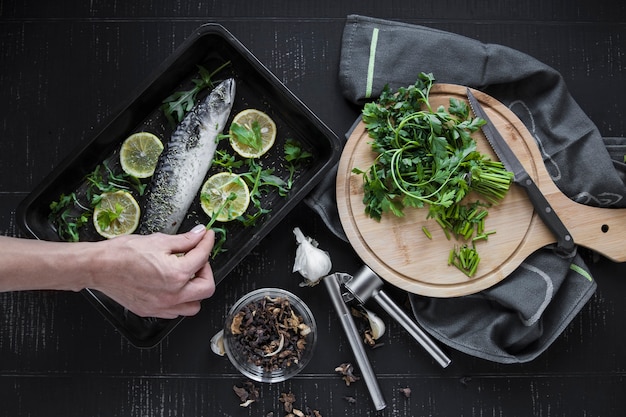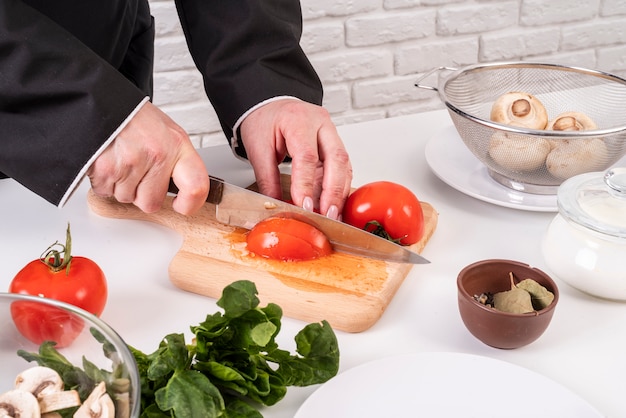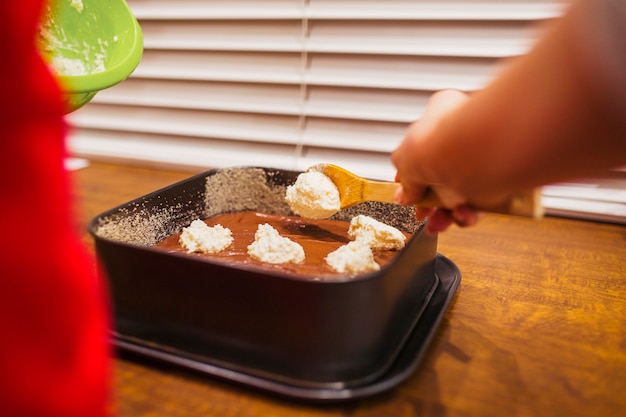(Part 1) Getting Started: Choosing and Preparing Swordfish

First, you need to get your hands on some great swordfish. I'm a big fan of local fishmongers. They're usually full of great advice, and you can tell by looking at the fish how fresh it is. But if you're not near a fishmonger, most supermarkets stock frozen swordfish, which is perfectly fine. Just be sure to pick a package that doesn't look like it's been frozen and re-frozen, and make sure the packaging is intact.
choosing the right cut
Now, when you're at the fish counter, you'll see a few different cuts of swordfish. The most common is the steak, which is a thick, rectangular slice cut from the side of the fish. This is what I usually go for because it's fantastic for grilling, baking, or pan-frying. You'll also see the chop, which is a smaller, rounder cut, often from the tail end. It's another great option for grilling or frying. For something a little different, try swordfish fillet, which is a thin, boneless piece, perfect for pan-frying or grilling.
I remember the first time I tried swordfish fillet. It was at a seaside restaurant, and the chef had pan-fried it with a simple lemon and herb sauce. It was incredibly delicate and melted in my mouth. I've been a fan of fillets ever since.
Preparing the Swordfish
Once you've got your swordfish home, preparing it is really easy. I just rinse it under cold water and pat it dry with paper towels. If you're using a steak or chop, you can leave it whole or cut it into smaller pieces, whichever suits you best. I like to score the flesh with a sharp knife before I cook it. It helps the fish cook more evenly and gives it a lovely criss-cross pattern that looks pretty on the plate.
And don't forget to season your swordfish! I love to keep it simple with just salt and pepper, but you can get creative with herbs and spices like garlic powder, paprika, or even a bit of cayenne pepper for a kick. Just remember that swordfish has a delicate flavor, so you don't want to overwhelm it with too much seasoning.
(Part 2) Pan-Frying Swordfish: A Classic Recipe

Pan-frying is one of the easiest and most reliable ways to cook swordfish. You get a crispy outside and a juicy, tender inside. It's a quick and simple recipe, perfect for a busy weeknight dinner. Here's how I do it:
Ingredients
- 1 swordfish steak, about 1.5 inches thick
- 1 tablespoon olive oil
- Salt and pepper to taste
- Fresh parsley, for garnish (optional)
Instructions
- Pat the swordfish steak dry with paper towels. Season generously with salt and pepper.
- Heat the olive oil in a large skillet over medium-high heat. When the oil is shimmering, carefully place the swordfish in the pan.
- Cook for 4-5 minutes per side, or until the fish is cooked through and slightly golden brown. The internal temperature should reach 145°F (63°C). You can use a meat thermometer to check.
- Remove the swordfish from the pan and let it rest for a few minutes before serving. This allows the juices to redistribute and the fish to stay moist. Garnish with fresh parsley, if desired.
Tips for Pan-frying
- Don't overcrowd the pan. If you're cooking more than one steak, cook them in batches to ensure they get nice and crispy.
- Use a good quality olive oil with a high smoke point. This will help prevent the oil from burning.
- Don't overcook the fish. Swordfish is best cooked medium-rare, as overcooking will make it dry and tough. You want it to be tender and flaky.
I find that a good pan-fried swordfish steak is best served with a simple side of roasted vegetables or a green salad. The flavors compliment each other so well.
(Part 3) Grilling Swordfish: Summertime Delight

There's something about grilling swordfish that just screams summer. The smoky flavor the grill imparts onto the fish is fantastic. And it's so easy to do, even for novice grillers. I'll show you how to achieve perfect grill marks and a juicy, succulent fish.
Ingredients
- 1 swordfish steak, about 1.5 inches thick
- 1 tablespoon olive oil
- Salt and pepper to taste
- Lemon wedges, for serving (optional)
Instructions
- Preheat your gas or charcoal grill to medium-high heat. For charcoal grills, make sure the coals are evenly distributed and hot before you put the fish on.
- Pat the swordfish steak dry with paper towels. Brush it with olive oil and season generously with salt and pepper.
- Place the swordfish on the grill and cook for 4-5 minutes per side, or until it's cooked through and has nice grill marks. The internal temperature should reach 145°F (63°C).
- Remove the swordfish from the grill and let it rest for a few minutes before serving. Serve with lemon wedges, if desired.
Tips for Grilling
- Don't move the swordfish around too much while it's grilling. Let it cook undisturbed for the first few minutes to develop those beautiful grill marks.
- Make sure the grill grates are clean and well-oiled to prevent the fish from sticking.
I love to grill swordfish with a side of corn on the cob and a simple tomato salad. It's a truly delicious and satisfying summer meal.
(Part 4) Baking Swordfish: A Simple and Healthy Option
If you're looking for a healthier way to cook swordfish, baking is the way to go. It's also a great option if you don't have a grill or a pan big enough for the fish. The oven does all the work for you, leaving you with moist, flavorful swordfish.
Ingredients
- 1 swordfish steak, about 1.5 inches thick
- 1 tablespoon olive oil
- Salt and pepper to taste
- 1 lemon, sliced
- Fresh herbs, like rosemary or thyme (optional)
Instructions
- Preheat your oven to 400°F (200°C).
- Pat the swordfish steak dry with paper towels. Brush it with olive oil and season generously with salt and pepper.
- Place the swordfish in a baking dish. Arrange the lemon slices over the top and sprinkle with fresh herbs, if desired.
- Bake for 15-20 minutes, or until the fish is cooked through and flakes easily with a fork. The internal temperature should reach 145°F (63°C).
Tips for Baking
- For a crispier skin, broil the swordfish for the last few minutes of cooking.
- Don't overcook the fish. Swordfish is best cooked medium-rare, so keep an eye on it and check its internal temperature regularly. Overcooked swordfish can become dry and tough.
- You can also bake the swordfish wrapped in foil for a more tender result. Just be sure to remove the foil for the last few minutes of cooking to allow the fish to brown slightly.
baked swordfish pairs really well with roasted vegetables or a side of quinoa. It's a simple but delicious meal that's perfect for any night of the week.
(Part 5) Swordfish with Mediterranean Flavours: A Taste of the Sunshine
I love the combination of swordfish and Mediterranean flavors. It's a perfect match, and it's a great way to bring a little sunshine into your kitchen. This recipe is quick, easy, and packed with flavor.
Ingredients
- 1 swordfish steak, about 1.5 inches thick
- 1 tablespoon olive oil
- 2 cloves garlic, minced
- 1/2 cup chopped tomatoes
- 1/4 cup chopped fresh basil
- 1/4 cup dry white wine
- Salt and pepper to taste
Instructions
- Heat the olive oil in a large skillet over medium heat. Add the minced garlic and cook for 1 minute, until fragrant.
- Add the swordfish steak to the skillet and cook for 3-4 minutes per side, or until it's cooked through. The internal temperature should reach 145°F (63°C).
- Add the chopped tomatoes, basil, and white wine to the skillet. Bring to a simmer and cook for 2-3 minutes, or until the sauce has thickened slightly.
- Season with salt and pepper to taste. Serve immediately.
Tips for Mediterranean Flavours
- Use fresh ingredients whenever possible. It makes a huge difference in the flavor of the dish.
- If you don't have white wine, you can use chicken broth or even water instead.
- Don't overcook the swordfish. It should be cooked through but still moist and tender.
This recipe is perfect served with a side of orzo pasta or couscous. It's a light and flavorful meal that's perfect for a warm summer evening.
(Part 6) swordfish with lemon and herbs: A Simple and Elegant Recipe
This is one of my go-to swordfish recipes. It's so simple, yet it's absolutely delicious. The combination of lemon and herbs, along with the delicate flavor of the swordfish, is heavenly.
Ingredients
- 1 swordfish steak, about 1.5 inches thick
- 1 tablespoon olive oil
- 1 lemon, zested and juiced
- 2 tablespoons chopped fresh parsley
- 1 tablespoon chopped fresh dill
- 1 clove garlic, minced
- Salt and pepper to taste
Instructions
- Preheat your oven to 400°F (200°C).
- Pat the swordfish steak dry with paper towels. Brush it with olive oil and season generously with salt and pepper.
- In a small bowl, combine the lemon zest, lemon juice, parsley, dill, and garlic. Pour the mixture over the swordfish steak, making sure to coat it evenly.
- Place the swordfish in a baking dish and bake for 15-20 minutes, or until the fish is cooked through and flakes easily with a fork. The internal temperature should reach 145°F (63°C).
Tips for Lemon and Herbs
- Use fresh herbs whenever possible. They really make a difference in the flavor of the dish.
- Adjust the amount of lemon juice to your taste. Some people prefer a more lemony flavor, while others prefer a more subtle flavor.
- You can also add other herbs to this recipe, such as rosemary, thyme, or oregano.
This recipe is perfect for a simple and elegant meal. It pairs well with roasted potatoes or a side of rice. It's a great option for a dinner party or a special occasion.
(Part 7) Swordfish with Roasted Vegetables: A Complete Meal in One Pan
This recipe is perfect for a quick and easy weeknight dinner. It's a one-pan meal, which means less washing up, and it's packed with flavor and nutrients. The swordfish and vegetables are roasted together, creating a delicious, harmonious dish.
Ingredients
- 1 swordfish steak, about 1.5 inches thick
- 1 tablespoon olive oil
- 1 red onion, chopped
- 1 red bell pepper, chopped
- 1 zucchini, chopped
- 1 yellow squash, chopped
- Salt and pepper to taste
- Fresh herbs, like rosemary or thyme (optional)
Instructions
- Preheat your oven to 400°F (200°C).
- Pat the swordfish steak dry with paper towels. Brush it with olive oil and season generously with salt and pepper.
- In a large bowl, combine the chopped vegetables with olive oil, salt, pepper, and fresh herbs, if desired.
- Spread the vegetables in a single layer in a baking dish. Place the swordfish steak on top of the vegetables.
- Roast for 20-25 minutes, or until the swordfish is cooked through and the vegetables are tender. The internal temperature of the swordfish should reach 145°F (63°C).
Tips for Roasting
- You can use any vegetables you like in this recipe. Some other good options include broccoli, asparagus, carrots, or potatoes.
- If you're using a smaller swordfish steak, you may need to adjust the cooking time. Check the internal temperature to make sure the fish is cooked through.
- For a more intense flavor, add a splash of white wine or chicken broth to the vegetables before roasting.
This is a complete meal in one dish. It's a great option for a busy weeknight when you don't have a lot of time to cook.
(Part 8) swordfish with mango salsa: A Tropical Treat
This recipe is a true taste of the tropics. The sweet and tangy mango salsa is the perfect complement to the rich, flavorful swordfish. It's a refreshing and exciting dish that's sure to impress your guests.
Ingredients
- 1 swordfish steak, about 1.5 inches thick
- 1 tablespoon olive oil
- Salt and pepper to taste
- For the salsa:
- 1 ripe mango, diced
- 1/2 red onion, finely chopped
- 1/4 cup chopped fresh cilantro
- 1 jalapeno pepper, finely chopped (optional)
- 2 tablespoons lime juice
- Salt and pepper to taste
Instructions
- Pat the swordfish steak dry with paper towels. Brush it with olive oil and season generously with salt and pepper.
- In a medium bowl, combine the mango, red onion, cilantro, jalapeno (if using), lime juice, salt, and pepper. Mix well and set aside.
- Heat a grill pan over medium-high heat. Place the swordfish steak in the pan and cook for 4-5 minutes per side, or until it's cooked through and has nice grill marks. The internal temperature should reach 145°F (63°C).
- Serve the swordfish immediately with the mango salsa on top.
Tips for Mango Salsa
- You can adjust the amount of jalapeno pepper to your taste. If you don't like spicy food, you can omit it altogether.
- For a sweeter salsa, add a teaspoon of honey or agave nectar to the mango salsa.
- You can also add other tropical fruits to the salsa, such as pineapple or papaya.
This is a fun and flavorful dish that's perfect for a summer BBQ or a light lunch.
(Part 9) Swordfish with Creamy Pesto Sauce: A Delightful Twist
This recipe is a real crowd-pleaser. The creamy pesto sauce, made with fresh basil, pine nuts, and Parmesan cheese, is a delicious complement to the swordfish. It's a satisfying and flavorful dish that's perfect for a special occasion.
Ingredients
- 1 swordfish steak, about 1.5 inches thick
- 1 tablespoon olive oil
- Salt and pepper to taste
- For the pesto sauce:
- 1 cup fresh basil leaves
- 1/2 cup pine nuts
- 1/4 cup grated Parmesan cheese
- 2 cloves garlic, minced
- 1/4 cup olive oil
- Salt and pepper to taste
Instructions
- Pat the swordfish steak dry with paper towels. Brush it with olive oil and season generously with salt and pepper.
- To make the pesto sauce, combine the basil leaves, pine nuts, Parmesan cheese, garlic, and olive oil in a food processor. Pulse until the ingredients are finely chopped and combined. Season with salt and pepper to taste.
- Heat a grill pan over medium-high heat. Place the swordfish steak in the pan and cook for 4-5 minutes per side, or until it's cooked through and has nice grill marks. The internal temperature should reach 145°F (63°C).
- Serve the swordfish immediately with the pesto sauce drizzled over the top.
Tips for Creamy Pesto
- If you don't have a food processor, you can chop the ingredients by hand. It will just take a little longer.
- You can adjust the amount of pesto to your taste. If you like a more intense flavor, add more pesto to the swordfish.
- The pesto sauce can be made ahead of time and stored in an airtight container in the refrigerator for up to 3 days.
This is a delicious and sophisticated dish that's perfect for a special dinner. Serve it with a side of roasted asparagus or a green salad.
(Part 10) swordfish with garlic and butter sauce: A Classic Combination
You can't go wrong with a classic garlic and butter sauce. It's simple, decadent, and perfectly complements the rich flavor of the swordfish.
Ingredients
- 1 swordfish steak, about 1.5 inches thick
- 1 tablespoon olive oil
- Salt and pepper to taste
- For the garlic and butter sauce:
- 4 tablespoons butter
- 4 cloves garlic, minced
- 1/4 cup chopped fresh parsley
- 1 tablespoon lemon juice
- Salt and pepper to taste
Instructions
- Pat the swordfish steak dry with paper towels. Brush it with olive oil and season generously with salt and pepper.
- Heat a grill pan over medium-high heat. Place the swordfish steak in the pan and cook for 4-5 minutes per side, or until it's cooked through and has nice grill marks. The internal temperature should reach 145°F (63°C).
- While the swordfish is cooking, melt the butter in a small saucepan over medium heat. Add the minced garlic and cook for 1 minute, until fragrant. Stir in the parsley and lemon juice, and season with salt and pepper to taste.
- Serve the swordfish immediately with the garlic and butter sauce poured over the top.
Tips for Garlic and Butter Sauce
- You can add a pinch of red pepper flakes to the sauce for a touch of heat.
- If you don't have fresh parsley, you can use dried parsley instead. Just use about 1 teaspoon of dried parsley for every tablespoon of fresh parsley.
- The garlic and butter sauce can be made ahead of time and stored in an airtight container in the refrigerator for up to 3 days.
This is a simple and satisfying dish that's perfect for a weeknight dinner. It pairs well with a side of mashed potatoes or steamed vegetables.
(Part 11) Swordfish with Asian-Inspired Flavours: A Fusion Delight
This recipe is a great way to add a touch of Asian-inspired flavor to your swordfish. The ginger, soy sauce, and sesame oil create a delicious and aromatic sauce that complements the fish perfectly.
Ingredients
- 1 swordfish steak, about 1.5 inches thick
- 1 tablespoon olive oil
- Salt and pepper to taste
- For the Asian-inspired sauce:
- 1 tablespoon soy sauce
- 1 tablespoon honey
- 1 tablespoon rice vinegar
- 1 tablespoon sesame oil
- 1 tablespoon grated fresh ginger
- 1 clove garlic, minced
- 1 teaspoon sesame seeds
Instructions
- Pat the swordfish steak dry with paper towels. Brush it with olive oil and season generously with salt and pepper.
- In a small bowl, whisk together the soy sauce, honey, rice vinegar, sesame oil, ginger, garlic, and sesame seeds. Set aside.
- Heat a grill pan over medium-high heat. Place the swordfish steak in the pan and cook for 4-5 minutes per side, or until it's cooked through and has nice grill marks. The internal temperature should reach 145°F (63°C).
- Serve the swordfish immediately with the Asian-inspired sauce drizzled over the top.
Tips for Asian-Inspired Flavours
- You can adjust the amount of honey to your taste. If you prefer a sweeter sauce, add more honey.
- If you don't have rice vinegar, you can use white vinegar instead.
- You can also add other Asian-inspired ingredients to the sauce, such as chili flakes, sriracha, or chopped scallions.
This is a flavorful and exciting dish that's perfect for a dinner party. Serve it with a side of brown rice or stir-fried vegetables.
(Part 12) FAQs
Here are some frequently asked questions about cooking swordfish.
How do I know when swordfish is cooked?
Swordfish is cooked when it reaches an internal temperature of 145°F (63°C). You can use a meat thermometer to check the temperature. The fish should also flake easily with a fork. If you're unsure, it's always better to err on the side of caution and cook it a bit longer.
What does swordfish taste like?
Swordfish has a slightly sweet, firm, meaty flavor. It's often compared to tuna or mahi-mahi. It's also quite versatile, taking on the flavors of the herbs and spices used in the recipe.
Is swordfish healthy?
Yes, swordfish is a good source of protein, omega-3 fatty acids, and vitamin D. However, it's important to note that swordfish can contain high levels of mercury. So, it's best to limit your consumption to once or twice a month, especially for pregnant women and young children.
How do I store swordfish?
If you're not using swordfish immediately, store it in the refrigerator for up to 2 days, wrapped tightly in plastic wrap. You can also freeze swordfish for up to 3 months. To freeze swordfish, wrap it tightly in plastic wrap and then place it in a freezer-safe bag.
What are some good side dishes for swordfish?
Swordfish pairs well with a variety of side dishes, but some of my favorites include:
| Side Dish | Description |
|---|---|
| Roasted vegetables | sweet potatoes, broccoli, asparagus, or Brussels sprouts |
| Green salad | With a light vinaigrette dressing |
| Couscous | With lemon and herbs |
| rice pilaf | With saffron or other spices |
| Pasta salad | With tomatoes, olives, and feta cheese |
So, there you have it! I've shared some of my favorite swordfish recipes with you, along with some tips and tricks to help you create delicious dishes. I hope you'll give them a try and let me know what you think. Happy cooking!
Everyone is watching

How to Cook Frozen Lobster Tails Perfectly: A Step-by-Step Guide
RecipesLobster. Just the word conjures up images of lavish meals, special occasions, and a taste of luxury. But let's...

Pork Fillet Cooking Time: How Long to Cook It Perfectly
RecipesPork fillet, or tenderloin as it's sometimes called, is a real favourite in our house. It's so versatile, and...

Pigs in a Blanket Cooking Time: How Long to Bake for Perfect Results
RecipesAh, pigs in a blanket. Just the name conjures up images of those delightful little parcels of crispy pastry en...

The Ultimate Guide to Cooking Delicious Frankfurters
RecipesLet's face it, we all love a good frankfurter. It's a classic, simple, and always satisfying. But let's be rea...

Wolf Meat Recipes: A Guide to Cooking Wild Game
RecipesLet's be honest, you don't see wolf meat at your local butcher shop every day. It's a bit of a wild card, but ...
